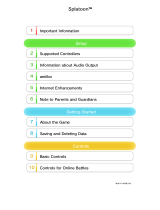
4 5
Before using the WiiU system read the following
important health and safety information, and be sure to
read the information in the Health and Safety application
available on the WiiU Menu screen. This application also
contains important usage guidelines for WiiU compo-
nents and accessories.
Important Safety Information
Read the following warnings before setup or use of the WiiU system. If this product will
be used by young children, this manual should be read and explained to them by an adult.
Failing to do so may cause injury. Please carefully review the instructions for the game you
are playing for additional health and safety information.
Throughout this manual, you will see this symbol followed by WARNING or CAUTION, or
you may see the term IMPORTANT. These terms have different levels of meaning as outlined
below. Please read and understand these terms and the information that appears after them
before using your WiiU system.
WARNING: Warns you about incorrect use of this system that could result in serious
personal injury.
CAUTION: Cautions you about incorrect use of this system that could result in personal
injury or damage to the system, components, games, or accessories.
IMPORTANT: Informs you about incorrect use of the system that could result in damage
to the system, components, games, or accessories.
WARNING - SEIZURES
• Some people (about 1 in 4000) may have seizures or blackouts triggered by light flashes or
patterns, and this may occur while they are watching TV or playing video games, even if they
have never had a seizure before.
• Anyone who has had a seizure, loss of awareness, or other symptom linked to an epileptic
condition should consult a doctor before playing a video game.
• Parents should watch their children play video games. Stop playing and consult a doctor if
you or your child has any of the following symptoms:
Convulsions Eye or muscle twitching Loss of awareness
Altered vision Involuntary movements Disorientation
To reduce the likelihood of a seizure when playing video games:
1. Sit or stand as far from the screen as possible.
2. Play video games on the smallest available television screen.
3. Do not play if you are tired or need sleep.
4. Play in a well-lit room.
5. Take a 10 to 15 minute break every hour.
Health and Safety Information WARNING - REPETITIVE MOTION INJURIES AND EYESTRAIN
Playing video games can make your muscles, joints, skin or eyes hurt. Follow these instruc-
tions to avoid problems such as tendinitis, carpal tunnel syndrome, skin irritation or eyestrain:
• Avoid excessive play. Parents should monitor their children for appropriate play.
• Take a 10 to 15 minute break every hour, even if you don’t think you need it.
• If your hands, wrists, arms or eyes become tired or sore while playing, or if you feel symp-
toms such as tingling, numbness, burning or stiffness, stop and rest for several hours before
playing again.
• If you continue to have any of the above symptoms or other discomfort during or after play,
stop playing and see a doctor.
CAUTION - MOTION SICKNESS
Playing video games can cause motion sickness in some players. If you or your child feels
dizzy or nauseous when playing video games, stop playing and rest. Do not drive or engage
in other demanding activity until you feel better.
WARNING - ELECTRIC SHOCK
To avoid electric shock when you use this system:
• Do not use the WiiU system during a lightning storm. There may be a risk of electric shock
from lightning.
• To minimize the risk of damage to your system, use only the AC adapter that comes with
your system.
• Do not use the AC adapter if it has damaged, split or broken cords or wires.
• Make sure that the AC adapter cord is fully inserted into the wall outlet or extension cord.
• Always carefully disconnect all plugs by pulling on the plug and not on the cord. Make sure
the WiiU power button is turned OFF before removing the AC adapter cord from an outlet.
WARNING - RADIO FREQUENCY INTERFERENCE
The WiiU console and accessories, including the WiiU GamePad, WiiU Pro Controller, and
Wii Remote controllers, can emit radio waves that can affect the operation of nearby electron-
ics, including cardiac pacemakers.
• Do not operate the WiiU console and accessories within 9 inches of a pacemaker.
• If you have a pacemaker or other implanted medical device, do not use the WiiU console
and accessories without first consulting your doctor or the manufacturer of your medical
device.
CAUTION - LASER DEVICE
The WiiU console is a Class I laser product. Do not attempt to disassemble the WiiU console.
Refer servicing to qualified personnel only.
CAUTION: Use of controls or adjustments or procedures other than those specified herein
may result in hazardous radiation exposure.
Specifications: Laser Type: Semiconductor laser Laser Wavelength: 405nm, 660nm
Laser Power: Max. 0.6mW, Max. 0.9mW Numeric aperture: 0.85, 0.6





















